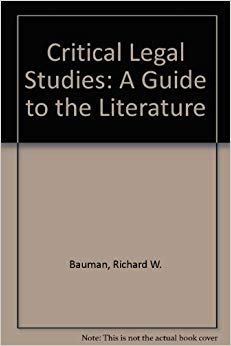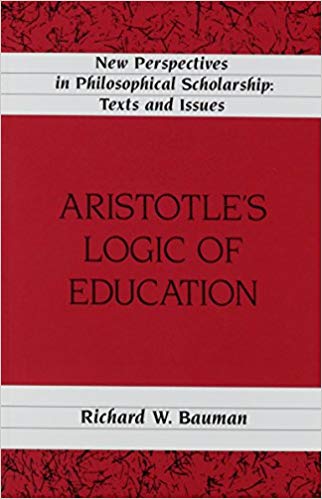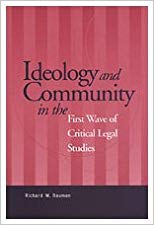Background
Richard Bauman was born on December 4, 1951, in Vermilion, Alberta, Canada.

University of Alberta
Dalhousie University
Oxford University





(Bauman (law, U. of Alberta) has organized a reading list ...)
Bauman (law, U. of Alberta) has organized a reading list for critical legal studies, creating a handbook for radical critique in response to established legal doctrines. As the author emphasizes in the preface, his bibliographies are not exhaustive, and the commentary at each chapter head is merely suggestive of the material; however this is an important source for beginning a critical legal study. The subject headings include the major veins of law practice (criminal, corporate, property, labor, international), and less discussed arteries in relation to law: feminism, critical race theory, Marxism, environmental law, the welfare state, literature, and the work of Roberto Unger. Annotation c. by Book News, Inc., Portland, Or.
https://www.amazon.com/gp/product/0813389801/?tag=2022091-20
1996

(In Aristotle's Logic of Education, Richard Bauman makes a...)
In Aristotle's Logic of Education, Richard Bauman makes a contribution to both the history of logic and the philosophy of education. He argues that Aristotle, in the course of laying out his system of syllogistic inference, intends to guide the way science is taught, rather than how scientific research is conducted. The teacher is supposed to proceed by the method of demonstration from the appropriate necessary premises. Dr. Bauman contends that the problems raised in Plato's Meno form the background for understanding Aristotle's presentation of logic in his Posterior Analytics. In light of Bauman's interpretation, a fresh approach should be taken to the recurrent claim that syllogistic reasoning always involves committing the fallacy of petitio principii. Finally, the author criticizes Aristotle's attempt to reduce both reasoning and teaching to singular patterns. In particular, Bauman argues that Aristotle fails to account adequately for the acquisition of first principles.
https://www.amazon.com/gp/product/0820440078/?tag=2022091-20
1998

(In Ideology and Community in the First Wave of Critical L...)
In Ideology and Community in the First Wave of Critical Legal Studies Richard W. Bauman presents a fresh, rigorous assessment of some of the key ideas developed by writers aligned with the early Critical Legal Studies movement. This book examines several major themes and arguments in the first decade of critical legal scholarship, predominantly in the U.S. in the period dating roughly from the mid-1970s to the mid-1980s. Heterogeneous and progressive, the Critical Legal Studies movement inspired a variety of leftist reexaminations and critiques of dominant liberal assumptions underlying the law and legal institutions. Bauman offers an exposition and assessment of the radical challenge to several central tenets of legal and political liberalism, including the values associated with individualism, moral skepticism, and state neutrality. He maintains that radical critics associated with early critical legal studies misapprehended many of the important assumptions and commitments of contemporary political liberalism and tended to misconstrue liberalism as relying on specific, deficient metaphysical underpinnings. Although the quest therefore, might have failed, the early Critical Legal Studies movement did succeed in sharpening discussions about the politics of law and legal interpretation and in providing a stimulus to other types of radical, contemporary critique.
https://www.amazon.com/gp/product/080204803X/?tag=2022091-20
2002
Richard Bauman was born on December 4, 1951, in Vermilion, Alberta, Canada.
Bauman graduated from the University of Alberta in 1973, receiving his Bachelor of Laws degree in 1981. He then obtained a Master of Education degree in 1983, and the next year received his master's degree in laws from Dalhousie University.
Bauman also obtained his doctorate from Oxford University in 1995.
Bauman started his career as a lawyer at a private practice in Edmonton in 1982. He then worked briefly as an assistant professor at Dalhousie University from 1984 to 1985 and as a counsel at Alberta Law Reform Institute from 1987 to 1988.
Since 1988, Bauman holds the position of a professor of law at the University of Alberta.
Richard W. Bauman is best known as the author of works in the field of legislation. His main works include Explorations in Difference: Law, Culture, and Politics, Critical Legal Studies: A Guide to the Literature, Aristotle’s Logic of Education and The Least Examined Branch: The Role of Legislatures in the Constitutional State.
(In Aristotle's Logic of Education, Richard Bauman makes a...)
1998(In Ideology and Community in the First Wave of Critical L...)
2002(Bauman (law, U. of Alberta) has organized a reading list ...)
1996
